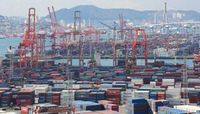SEOUL, March 21 (Yonhap) -- South Korea is anticipating increased uncertainty in its trade landscape following the U.S. government's implementation of "reciprocal" tariffs. First Vice Industry Minister Park Sung-taek addressed these concerns during a meeting focused on export trends and related risks.
Park remarked, "Exports slightly increased in February, but environments surrounding exports are still unfavorable." He highlighted that the U.S. administration has already imposed duties on all steel and aluminum imports, alongside related derivative products. If reciprocal tariffs come into effect as planned on April 2, 2025, this could further destabilize the existing export framework.
In the first two months of 2025, South Korea's exports amounted to a total of $101.6 billion. This figure represented a 4.8 percent decline compared to the same period in the previous year. While exports of semiconductors, wireless communication devices, computers, and bio-health products witnessed an uptick, the export of petroleum products saw a drastic drop of 20.5 percent.
Moreover, Park noted that the ministry is actively working to address the nation's concerns regarding U.S. tariffs through ongoing discussions. Industry Minister Ahn Duk-geun is currently in Washington, engaging with key U.S. officials, including Secretary of Energy Chris Wright and Secretary of Commerce Howard Lutnick. "We will work to minimize the negative impact on our exports from the U.S. trade policies," Park assured.
Additional data releases also revealed a 4.5 percent rise in exports from March 1 to March 20, 2025, totaling $35.5 billion. This is a substantial increase compared to the same period last year, indicating a silver lining amid challenging trade relationships. The Korea Customs Service confirmed that while imports declined by 1.4 percent to $34.4 billion, the trade balance recorded a favorable surplus of $1.1 billion.
Among the standout performers in South Korea's export roster, semiconductors marked an impressive $7.1 billion in exports, reflecting an 11.6 percent rise. The shipbuilding sector showed remarkable growth as well, with exports rising by 80.3 percent to $2.2 billion. Conversely, the steel sector faced challenges, with exports declining by 10.7 percent to $2.3 billion. Similarly, the petroleum industry reported a steep drop of 24.6 percent to $2.1 billion, and exports of automobile parts slipped 5.9 percent to $1.2 billion.
Evaluating performance in key markets, exports to the United States reached $6.7 billion, marking a modest 2.5 percent increase. The European Union saw a more significant rise of 15.2 percent in imports from South Korea, totaling $4.2 billion. Additionally, exports to Vietnam increased by 4 percent to $3.2 billion.
In contrast, exports to China have declined by 3.8 percent to $6.4 billion, while Hong Kong's take from South Korea fell significantly by 16.4 percent to $1.2 billion.
Overall, the current trends suggest that while some sectors within South Korea's economy are flourishing, the looming tariffs and ongoing global economic conditions are causing considerable anxiety for the country’s export performance.
Minister Park concluded by emphasizing the importance of fostering positive trade relations, adding, "Our commitment is to ensure that our economic foundations are resilient enough to navigate these turbulent waters." This statement encapsulates the administration's resolve to maintain a robust export environment despite intensifying external challenges.

